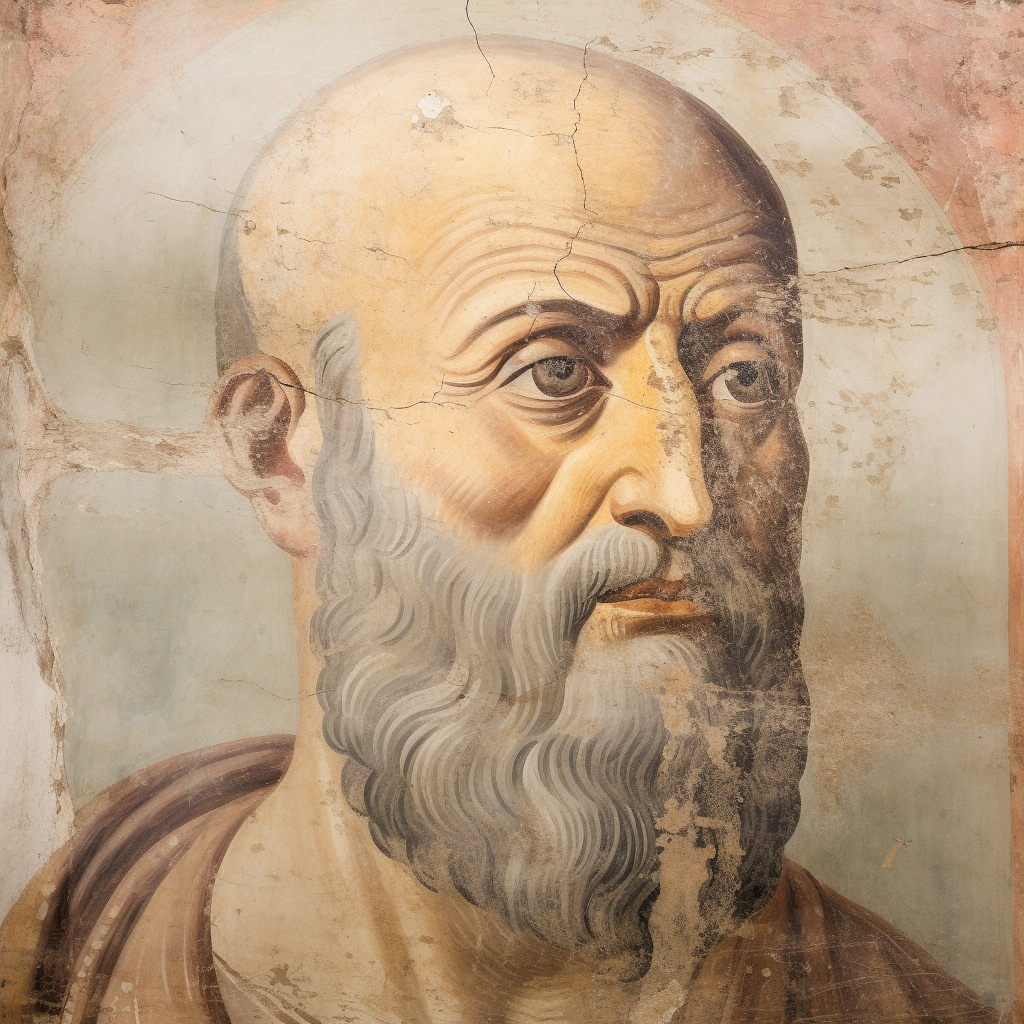Plotinus
Head of Platonic Academy

Plotinus was a mysterious philosopher who appeared in Rome around the time of the crisis era. He came with an extremely well-developed system of Platonic theology and meditative practices that continued to endure for millennia, becoming known as "Neoplatonism".
He was born in Egypt to a Greek family, but it is known that Plotinus never discussed his nationality, upbringing, date of birth or any particular biographical data. He wished to be known totally for his ideas and teachings and found such details to be an irrelevancy. Beyond that, he had a contempt for aligning himself too much with his current lifetime.
The philosopher spent many years in Alexandria during his youth training with Ammonius Saccas. After a while, since he had learned everything of Greek philosophy, he attempted to travel to Persia, Babylon and India, an attempt frustrated by the failed military campaign of emperor Gordian III.
Plotinus school in Rome attracted the attention of many important men of the Empire. Copious members of the Senate attended his lectures, anxious for a resolution to the prevailing political problems of the great imperial state: some of these men later in advanced age would administer during Diocletian’s reign in an attempt to fix the issues of the day.
Women were numbered highly among his students, unusual in Rome itself at the time. These include the mother and daughter both named Gemina and the wife of Iamblichus’ son, Amphiclea. He was also so well regarded by his patrons that he was entreated to care for many of the children of Rome’s elite and to set them on the right path:
Many men and women of the highest rank, on the approach of death, brought him their children, both boys and girls, and entrusted them to him along with all their property, considering that he would be a holy and god-like guardian. So his house was full of young lads and maidens, including Potamon, to whose education he gave serious thought, and would even listen to him revising the same lesson again and again.1
He was also a great arbitrator of disputes and problems of the people. Although Rome was a high-pressure environment with many feuds, Plotinus is known to have made no significant enemies, showing the extreme balance and care of his character that seemingly made the possible impossible. He was hailed among the Roman people as a legendary figure of kindness and utmost morality.
The risen status of Proclus was even evident to others. It is known outright in the biographies that Plotinus also had a major God as his Guardian, a matter that fully surprised a visiting Egyptian priest who was attempting to summon his own Guardian spirit in Plotinus’ presence in the Temple of Isis to impress the Romans. The foreign man was shocked to see a major God standing before him in the flesh, conceding that Proclus was greater than he.
The philosopher made friends with the emperor Maxentius and his wife. He attempted to revive the fortunes of an ancient city of philosophers in the Italian province of Campania, which he prospectively renamed Platonopolis. Unfortunately, the rebuilding and repopulation of this city was prevented by the jealous intrigues of some of the courtiers of the emperor and certain Christian infiltrators at court.
PHILOSOPHY
The venerated philosopher of Rome created and sustained many elaborations on the exact nature of order in Plato’s cosmos. Many modern scholars since the Enlightenment see these as an oriental deviation of little value and some attack Plotinus as a thief of eastern doctrines, but the truth was that Plotinus was communicating many of the inner complex doctrines of Platonic theory, not riffing off of appropriated ideas from the Middle East.
Although Plotinus is described as a reinvigorator of Plato’s doctrines, much of his philosophy came from Aristotle, whose Metaphysics and discourses on the Gods play a large role in the structure of the Enneads. He was also influenced by some of the finer teachings of the Stoics, which he incorporated into his system. Finally, it was Pythagorean theory that also made its way into Plotinus’ system.
His writings, however, are full of concealed Stoic and Peripatetic doctrines. Aristotle’s Metaphysics, in particular, is concentrated in them. He had a complete knowledge of geometry, arithmetic, mechanics, optics and music, but was not disposed to apply himself to detailed research in these subjects.1
CRITIQUES OF UNBELIEF
Incensed at the level of corruption taking place in late Rome, he issued a vigorous attack on Christianity, which was already spreading to certain Gentiles in the Roman Empire and was in a highly modified form corrupting major schools of philosophy. Other schools spread the doctrines of Zoroastrianism from Persia, which Plotinus through his students denounced as a set of modern forgeries barely linked to the historical Zoroaster. Certain philosophical schools invariably at this point had attacked Plato and claimed to the people that the latter had gotten to the bottom of nothing in regards to intelligible reality, a perception that Plotinus was keen to reverse.
It was these factors that motivated him to write the invective named On the Gnostics, in which he attacked several philosophical schools and sects, particularly in their assertions that the world was inherently evil and in already identifying Plato’s creator as the despicable demiurge. Some of these strange ideas had made headway into his students, compelling him to dispel myths even more.
He accused Gnostics and Dualists of despising everything inherent in the material and lower realms, which taken to a logical conclusion would make them conclude no symbol in existence emanated from any higher realm.
ENNEADS
His masterpiece was the Enneads, a complex philosophical and theological work of six books with nine parts. According to Porphyry, Plotinus is known to have carefully scrutinized whomever were sent copies and this was an elite few people. Frankly, this is not a book designed for non-initiates and cannot be read as one: it is full of dense and difficult topics related to advanced meditation, physics and other matters.
ONE AND MONAD
All of Plotinus’ works are extremely complex treatises but function around an ordering of the One or Monad in the universe, prior to and integral to everything that was formed out of it. He indicates ways of attaining union with this impersonal life-force by using advanced meditation and other forms of meditative practice.
LEGACY
Many of Plotinus’ mysterious works became categorized as being ones of Plato in the Islamic Caliphate and made their way to Europe years later under that guise. It was only until the time of Plethon and the greatest disciple of Plotinus, Marsilio Ficino, that matters began to change.
BIBLIOGRAPHY
1On the Life of Plotinus and the Order of His Books, Porphyry

 አማርኛ
አማርኛ العربية
العربية বাংলা
বাংলা Български
Български 中文
中文 Čeština
Čeština Dansk
Dansk Deutsch
Deutsch Eesti
Eesti Ελληνικά
Ελληνικά Español
Español Français
Français हिन्दी
हिन्दी Hrvatski
Hrvatski IsiZulu
IsiZulu Italiano
Italiano 日本語
日本語 Kiswahili
Kiswahili Magyar
Magyar Македонски
Македонски नेपाली
नेपाली Nederlands
Nederlands فارسی
فارسی Polski
Polski Português
Português Română
Română Русский
Русский Slovenščina
Slovenščina Suomi
Suomi Svenska
Svenska Tagalog
Tagalog Türkçe
Türkçe